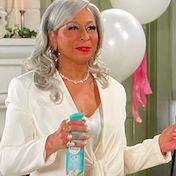If Soaps Were Regarded As Prestige TV...
-
Recently Browsing 0 members
- No registered users viewing this page.
-
Recent Posts
-
By I Am A Swede · Posted
I think we have learned by now that you can never be sure anyone's actually dead on a soap... -
By I Am A Swede · Posted
I think this has been one of the best years in a long time. In no small part due to the fact that so many countries have chosen to sing in their native language. Songs like the ones from Greece and Latvia have benefitted immensely from this, and made those two personal favourites of mine. I think Greece has the most incredibly beautiful staging and Klavdia's voice is outstanding. I don't think she has any real chance of winning, but if she did I would be ecstatic. Luxembourg is another favourite of mine and Laura (with her dancers) really sold that song with the new staging. Her performance in the final was flawless and I will be very disappointed if she doesn't improve on last year's result for Luxembourg (13th). -
By Reverend Ruthledge · Posted
If those came from that mass-produced CD that was put out a while back, I'm afraid those episodes are wildly out of order and are very confusing to listen to. I had to painstakingly put them in order to make sense of things. I need to make my own CD to give to people just to try and fix the problem. Thankfully, I had time during the lockdown to do that. Just a word of warning. -
Some spoilery press photos:
Please register in order to view this content
-
With so many reference to Caroline, how many months before 'Linus' appears? We already know *twins* run in the Spencer family. We know very little about Liam's birth, etc. Please tell me it'll never happen. Brad undercutting the significance of Steffy/Hope scenes, which were great, by having Steffy squeal to Taylor less than an hour later. I was initially glad that Carter finally got a leading man story, except they've completely destroyed what made him likeable - from the imaginary House of Forrester, fake LLC papers and, Friday, he blames everything on Hope. Gross. Daphne being certain that Hope would go back to Liam is contrived. She knows nothing about their history. How many times has the Nose met Liam? If, say, Katie, Ridge or Steffy made the suggestion, at least, it would be believable from those characters' history/point-of-view.
-
Sometimes I forget Mindy had been married four times in the space of a decade. Those are Erica Kane numbers.
-
By Contessa Donatella · Posted
This is Part 2 but I was wrong, there is no 3. Today we are going review one of the questions: “What are your thoughts on the validity of the Daytime Emmy Awards?” At this time, there was a lot of negative feelings about the awards, from the politics, the nomination process and even, where should they be held. MARY STUART: “No, comment. No, I really think it’s silly. It’s only an award for one particular performance, too. It’s ridiculous.” CARL LOW: “I understand they’re trying to change the format of selection, because a one-shot performance does not reflect a year’s work. Who can remember that one particular performance?” MARY STUART: “You’re supposed to save it. Three years in a row my tapes were erased. So I’m ineligible? One of the other sponsors said they didn’t want anyone on a P&G show nominated. Does that make sense? And the people who really hold the industry together never have any juicy scenes. People like Charita Bauer and Carl Low. I wish it were not a national game, but instead, a peer activity. I would believe in it if it were presented by our peers and it were private, within the industry from people who really care. Then it means something.” Mary made some very valid points. Until 1976, except for her nomination in the first year, no actor for a P&G show was nominated in the first two years of the awards. So, 1974 one nominee & 1975 zero nominees. That means only one out of about a hundred actors over five shows (SFT, EON, GL, ATWT and AW) were not nominated. LARRY HAINES: “I don’t think there should be fewer categories in daytime than there are in nighttime awards. If there is one for best performer, there has got to be one for best supporting performer, because nobody plays in a vacuum. It’s not a one person effort. The categories are voted on by a completely unbiased panel.” BILLIE LOU WATTS: “I agreed to be a judge last year. But I was not allowed to vote for best actor because we had two for our cast were nominees – Larry (Haines) and Michael (Nouri). I might be biased toward them. I also could not vote in best actress, since Mary (Stuart) was nominated. I could only vote in categories where I had no personal attachments. The only problem about the daytime awards is that the great test of a performer on a daytime show is how well he performs all year long. You can’t judge that unless you have someone who monitors it every week. They have increased it from judging just one scene to three, but…” VAL DUFOUR: “I resent the Daytime Emmy Awards and will have anything to do with them, as long as were presented in the daytime, with stuffed animals, instead of at night. I’m a member of AFTRA (American Federation of Television and Radio Artists), Screen Actors Guild (SAG) and Equity (the theater union) and I want the work I do represented with other member of my profession. As far as I am concerned, they are an insult to the actor. Number one, they (Academy members) don’t even begin to understand how to decide or judge, to say nothing of the fact the whole premise is phony, because it’s a bought, political thing. If you can get together 25 votes, then they’ll nominate you. They have advised us not to put up any actor, unless he or she’s known for anything else, because we’ll be wasting our votes! Now how do you like that!? Another thing, where does he good performer come in? It’s a different thing if you have a 2 ½ hour picture and you’re discussing this actor and only that performance – how can you do this on a soap? The worst actor in the world can be brilliant in one scene – it has to be looked at in a broader scope; you have to get a continuity of an actor’s performance on a soap. The Daytime Emmy’s are a raunchy, cheap marketplace that has nothing to do with the honor that should be placed on a beautiful performance.” MORGAN FAIRCHILD: “I’m very apolitical and consider the whole thing very political. And I think anybody on the soaps realizes this.” MICHAEL NOURI: “I have mixed feelings about it. Having been nominated for one was very flattering and having been nominated, I like that part. But there’s something farcical about it: the Academy Awards, all awards. People are judged on the basis of one performance, which says nothing about somebody’s overall character portrayal. I have seen some people come in for just a one-short. I can sense how really good they are, but because of their nervousness, they’re just not relaxed enough to get to what they have to offer. So the criterion for the awards is off-base, I think.” TOM KLUNIS: “In a way I think it’s good and gives recognition to the actor and the medium. I think possibly it’s commercially necessary…” MARIE (MAREE) CHEATHAM: “That’s not high on my list of feelings. How can you judge…If a performer is consistently fine and does something very interesting with very little material…that’s the trick in daytime.” LEWIS ARLT: “No comment.” MILLIE TAGGART: “I think the award for the male performer who won last year’s award was the most valid award ever given. I can’t judge for any others, but Larry is a wonderful, wonderful actor-he’s the best that I’ve ever known.” JOHN CUNNINGHAM: All such awards are really invalid because the only way could really judge whose better for that year, would be if everybody contesting then played the same part. Because to say an apple is better than an orange is crazy. You just can’t do that. That’s why George C. Scott was right to turn down his Oscar. Somebody has to stand up every so often and say it’s a lot of crap.” MILLIE TAGGART: “You can have a wonderful story one year, while someone else is vacuuming…” JOEL HIGGINS: “It’s a very loaded question at this time because there is a furor raging between L.A. and New York about the whole thing and when it gets to the point, it’s silly. You’re no longer awarding someone because they’re the best…You’re awarding them because they live in L.A. or New York. I’m sure anyone who has ever won is talented. But I think there are so many talented people-how you can possibly say this person’s better than that? It depends on the character, what they get to play…a million things. Stack the Emmy’s up against the Pulitzer Prize, where it’s not a group of nominees and only one winner. They say, “We’re going to give 12 of them this year, because these were all good achievements.”” PETER SIMON: “Ludicrous, absolutely ludicrous.” COURTNEY SHERMAN: “I hate the idea. Talk about various aspects of the business, the daytime drama is definitely a field unto itself; there really is a repertory company feeling here. I don’t think it is ever to any one’s advantage to have competition for awards. As dignified as everyone may act about it, I think it’s destructive and silly. It’s different with a play or movie-they’re entities unto themselves, but I find the Emmys offensive. PETER SIMON: “The process of selection is all done on the number of friends you have for votes. And this ridiculous competition now between the two coasts, as to where the Emmys are going to be handed out. I mean, what are they talking about? In a soap, where does the performance end? There are certain people in the shows who have all the gravy and other really fine actors who do nothing but the drudgery. The categories in soaps should be best recap, best getting through a scene without fainting…” COURTNEY SHERMAN: “Not that you can’t be a fine actor sitting and drinking coffee, but is that the scene you’re going to give to the board of judges?” Obviously a lot about the Emmys have changed since 1976. But a lot has stayed the same as well. Too many fine actors, both in Daytime and Primetime have NEVER been nominated. Whole shows are ignored while others are nominated year after year. Love of Life was only nominated for ONE acting award, and that was for Shepperd Strudwick, who has previously been nominated. This year in primetime, Ted Lasso (an excellent show) got many nominations as it has every year, but Ghosts has been ignored again. Different shows, but both excellent. What is your opinion? -
very danceable theme song https://x.com/iammskye1/status/1923509048416043443
-
You are not. I'm so happy that this storyline for Anita is finally showing movement.
-
A shame that Santa Barbara lost the Andrades but I wonder what the Dobsons had in mind for them. From what I know of the Joe/Kelly situation, they didn't seem to know what to do with the Perkins. I don't think McConnell in particular gets enough acclaim for what she added to the show. The Dobsons (from what I know of the show) didn't seem to know what to do with Augusta. This was especially true on their second go around but that was also Rauch getting back at her, so who knows?
-




.thumb.jpg.ce9e5b41e408ffdc4f147a5719363824.jpg)


Recommended Posts
Archived
This topic is now archived and is closed to further replies.